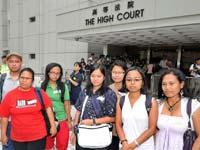Filipino maids in a race row

Filipino maid, Evangeline Vallejos is fighting for the right to live permanently in Hong Kong.
But she does not plan to stay, if she wins this battle which has already deeply divided the former British colony and sent jitters across Asian nations that have hundreds of thousands of foreign domestic helpers in their countries.
Vallejos, 59, has been employed as a maid in Hong Kong since 1986.
Last week, a Hong Kong court ruled as unconstitutional a law banning foreign maids from permanent residency in a landmark move sparking heated debate in the Asian financial hub.
The legal action brought by Vallejos, has cast a spotlight on the treatment of Hong Kong’s army of 292,000 domestic helpers.
Vallejos, a mother of five, challenged the restriction, saying it was unconstitutional and discriminatory, while the government argued it was appropriate.
“I am very happy I won. Ang tagal kong hinintay ito (I have long waited for this).”
She said many Filipino workers in Hong Kong were happy about the court decision handed down on Sept. 30 because it paved the way for thousands of others to seek permanent residency.
But in Barangay Paurido outside Manila where Vallejos’ family lives, there was hardly a stir when news broke of her legal victory.
Family members took pride in her achievement. But while a door has been opened for them to live in Hong Kong, Vallejos’ husband, Zacarias Oria, said they were not planning to do so.
Whether she stays in Hong Kong or not, Vallejos legal victory has the Hong Kong government drumming up populist opposition to the grant of abode for long-resident maids by suggesting that they will be a huge flood which would swamp the territory and bring with them their families, undercut wages and inundate schools and hospitals.
There are some 300,000 foreign domestic helpers, as the maids are technically known, of whom about 100,000 have been there for the minimum seven years required before they might become eligible for abode. Most are from the Philippines and Indonesia with a few from South Asia -- only brown Asians apparently qualify to be maids, reported the Asian Sentinel.
In a commentary, the Asian Sentinel said : “There is certainly a groundswell of popular sentiment against the helpers getting abode, much of its created by the Democratic Alliance for the Betterment of Hong Kong (DAB) the Communist party’s local surrogate. It plays to a real concern that Hong Kong is too crowded already and that low-skill migrants from the mainland are already are a burden on the territory. But instead of arguing that low-paid helpers are undercutting the wages of low skill local people -- which is obviously the case -- the DAB and other pro-government politicians make what amounts to a race-based case against the helpers. The reality is that Hong Kong’s middle class (and lower) wants it both ways. It wants access to cheap and disposable foreign labor without having to grant these people normal rights. Helpers now constitute 7 percent of the Hong Kong workforce.
Hong Kong may think that this is just a local matter. But it should not be surprised that its racist assumptions are now getting international exposure. Even without the helper issue, Hong Kong has a poor record of treatment of minorities other than whites and those from ‘Confucian’ countries such as Korea. Permanent identity card symbols in practice discriminate between ethnic Chinese and others. Hong Kong is forever alert to the slightest suggestion of discrimination, past or present against Chinese in the US or Canada, and justifiably condemning anti-Chinese policies in Malaysia. But its own dubious practices are now beginning to get some attention just at a time when suspicions of Beijing’s assumptions of superiority are increasingly troubling its southern neighbors.”
HERE ARE SOME KEY FACTS ABOUT THE PERMANENT RESIDENCY AND WHY IT MATTERS TO FOREIGN DOMESTIC HELPERS:
• UNDER HONG KONG’S BASIC LAW, THE CITY’S MINI-CONSTITUTION, FOREIGNERS WHO ENTERED HONG KONG WITH VALID TRAVEL DOCUMENTS AND HAVE “ORDINARILY RESIDED” IN THE CITY FOR SEVEN YEARS CONTINUOUSLY CAN SEEK PERMANENT RESIDENCY.
• PERMANENT RESIDENTS ENJOY THE RIGHT TO VOTE AND TO STAND FOR ELECTION.
• PERMANENT RESIDENTS CAN STAY IN HONG KONG WITHOUT A WORK VISA, HAVE ACCESS TO BENEFITS SUCH AS PUBLIC HOUSING.
• FOREIGN MAIDS, WHOSE WORK VISA IS CURRENTLY TIED TO A SPECIFIC EMPLOYER, CAN TAKE UP OTHER JOBS ONCE THEY BECOME PERMANENT RESIDENT.
• AT PRESENT, FOREIGN MAIDS MUST FIND ANOTHER JOB IN DOMESTIC SERVICE OR LEAVE HONG KONG WITHIN TWO WEEKS IF DISMISSED BY HER EMPLOYER. AS A PERMANENT RESIDENT, THEY WILL NOT BE BOUND BY THE TWO-WEEK RULE
• OF THE 292,000 FOREIGN DOMESTIC HELPERS, 117,000 HAVE LIVED IN HONG KONG FOR AT LEAST SEVEN YEARS AS OF DECEMBER LAST YEAR.









